Table of Contents
Willpower impacts nowhere near just our daily decisions. A groundbreaking study that tracked 1,000 individuals from birth to age 32 revealed something remarkable. People who showed high self-control during childhood grew into adults with better physical and mental health, fewer substance abuse issues, and stronger financial security. Understanding how to build willpower can be crucial in maintaining these benefits.
To learn how to build willpower effectively, it’s essential to recognize the role it plays in shaping your habits and decisions.
When discussing how to build willpower, consider the impact of self-discipline on life outcomes.
Understanding how to build willpower requires commitment and consistent practice.
This guide explores numerous methods on how to build willpower, offering practical advice for lasting changes.
Research demonstrates that willpower represents our capacity to delay gratification and resist immediate temptations that lead to long-term success. University of Pennsylvania’s psychologists have found that self-discipline is a vital predictor of students’ academic achievement – even more than IQ.
Researching how to build willpower can provide insights into enhancing your self-control.
Science-backed strategies can help build effective willpower. This piece offers practical exercises and explains willpower depletion. You will find research-based approaches to strengthening your self-control that deliver real results.
Many wish to learn how to build willpower to achieve their goals effectively.
People often seek ways on how to build willpower that align with their personal development journeys.
In this article, we will explore various techniques and methods on how to build willpower that can lead to greater productivity and personal success.
Knowing how to build willpower can significantly influence one’s long-term success.
Positive thinking and learning how to build willpower go hand in hand for better outcomes.
To genuinely understand how to build willpower, it’s important to explore various theories.
This insight is vital for anyone looking to improve how to build willpower.
Understanding tasks as they relate to how to build willpower can enhance performance.
Identifying how to build willpower through knowledge can catalyze growth.
Various strategies on how to build willpower focus on enhancing mental fortitude.
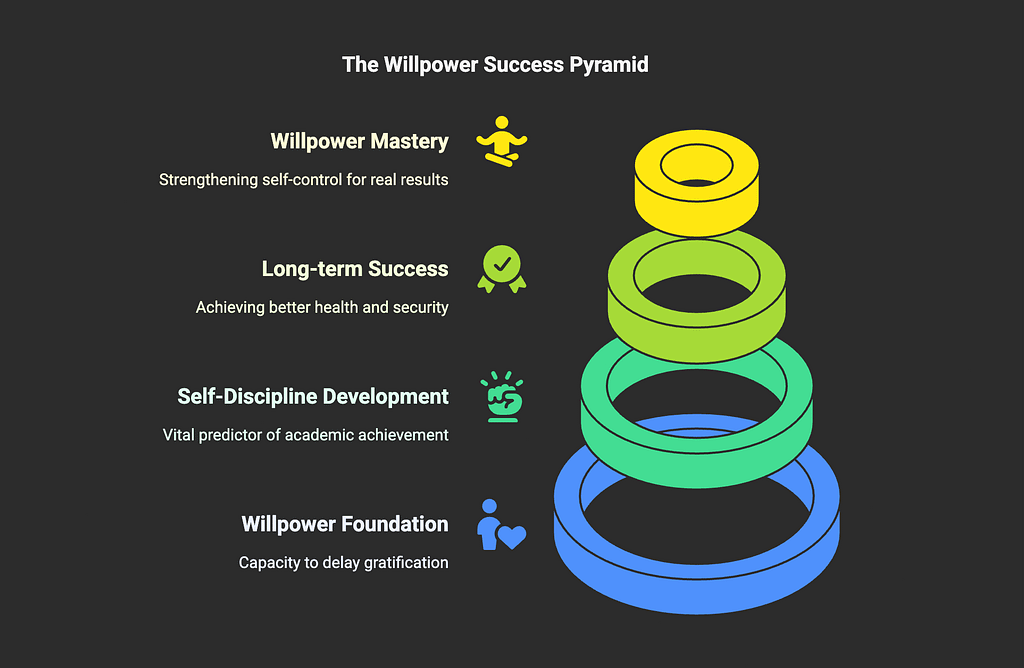
What Science Tells Us About Willpower
“Ego depletion theory proposes that self-regulation depends on a limited energy resource (willpower). The simple initial theory has been refined to emphasize conservation rather than resource exhaustion, extended to encompass decision making, planning, and initiative, and linked to physical bodily energy (glucose).” — Roy F. Baumeister, Professor of Psychology at University of Queensland, leading researcher on willpower. This research is significant for those looking to learn how to build willpower effectively.
Scientists have found something fascinating about how our brains handle self-control. People relying on pure willpower to reach their goals seem more trustworthy than those using tools like swear jars or internet blockers.
Key research findings on willpower
The last 40 years of research showed that knowing how to resist temptation early in life links strongly to future success. Kids with better self-control in preschool went on to get higher SAT scores and showed boosted social thinking skills as teenagers. These benefits lasted well into adulthood, leading to better education, stress handling, and less substance abuse. This highlights the importance of learning how to build willpower from an early age.
Building a solid foundation on how to build willpower can lead to significant personal improvements.
Knowing how to build willpower allows individuals to keep progressing toward their goals.
Assessing your current state is essential when learning how to build willpower effectively.
A breakthrough study found that people who think positively have substantially more willpower. The research team saw huge differences in determination between the most positive 5% of thinkers and the least positive 5%.
The traits of strong willpower often reveal critical insights on how to build willpower.
Recognizing signs of strong willpower can guide you on how to build willpower.
The willpower depletion theory
Scientists have taken a hard look at willpower depletion lately. The original theory suggested self-control worked like a muscle that gets tired from overuse. In spite of that, a newer study published by researchers suggests our beliefs about willpower really affect how well it works. People who see willpower as endless show less fatigue after using self-control.
A complete analysis of 198 separate studies found that doing tasks that need self-control right after another tough activity led to worse performance, with a medium to large effect size of about 0.6. On top of that, this pattern has been copied at least 130 times in tasks of all types.
Brain regions involved in self-control
Neuroscience has pinpointed specific brain regions that play a significant role in willpower. The prefrontal cortex, especially the right inferior frontal gyrus (rIFG), helps control our thoughts, emotions, and actions. This region works with other areas including:
- The dorsal anterior cingulate cortex (dACC) – Spots conflicts between what we want and what we do automatically
- The presupplementary motor area (preSMA) – Processes control signals
- The subthalamic nucleus (STN) – Helps stop unwanted behaviors
Exploring common weaknesses can shed light on how to build willpower more effectively.
Brain scans show that people with more self-control have higher activity in their prefrontal cortex when temptation strikes. The ventral striatum, which handles desires and rewards, lights up more in people with less self-control.
Physical and mental stress can really affect these brain areas. Stress makes our brain release chemicals like norepinephrine and dopamine that temporarily weaken the prefrontal cortex’s control. In spite of that, research shows women might be extra sensitive to these changes because of how estrogen affects stress responses.
The science behind these brain networks opens up exciting possibilities to develop willpower. Regular practice of self-control activities can strengthen these networks over time, just like exercise builds muscle. People can boost their self-control in many areas through consistent training, from managing emotions to controlling behavior.
Understanding Your Current Willpower Level
You need to know your self-control level before learning advanced willpower techniques. This creates a baseline to track your progress. Research shows that people who understand their willpower’s strong and weak points develop better personal growth strategies.
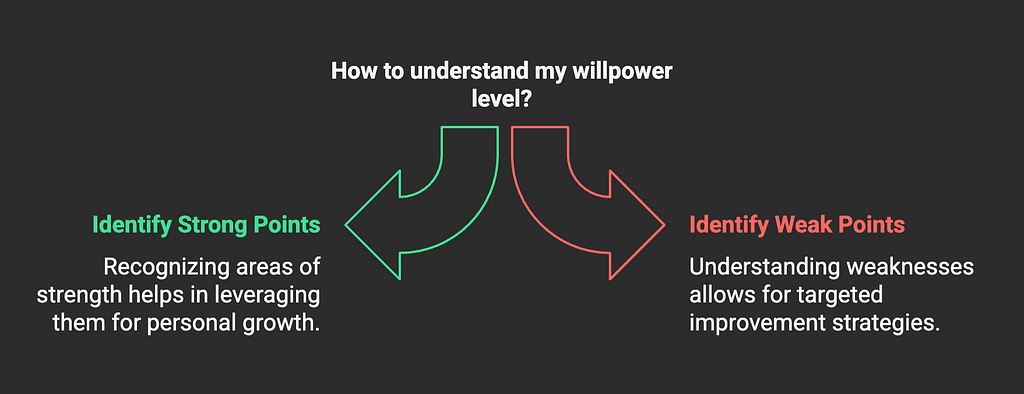
Signs of strong willpower
People with strong willpower stand out from others. They make excellent decisions that line up with their long-term goals instead of quick rewards. These people also show amazing persistence and stay focused on their goals despite obstacles.
Overcoming negative thoughts is crucial when you learn how to build willpower.
The largest longitudinal study shows that people with solid willpower share these traits:
Implementing strategies on how to build willpower can enhance your daily effectiveness.
- They stick to their daily routines and habits with discipline
- They bounce back quickly from setbacks
- They believe in themselves and stay motivated from within
- They take action to reach their goals
Research shows that people who score high on willpower tests are better at controlling their emotions. They handle stress well and stay calm under pressure. These individuals typically score above 30 on standardized willpower assessments, which shows they can handle life’s challenges confidently.
Common willpower weaknesses
Knowing what drains your willpower helps you improve it. Studies reveal patterns that show when willpower might be running low:
Mental strain takes up a lot of your energy. Research proves that mental stress consumes approximately 25% of the body’s circulating blood glucose, which leaves less power for self-control. This shows up as:
- More likely to give in to temptations later in the day
- Hard time focusing on complex work
- Quick to act on impulses when stressed
Not getting enough sleep really hurts your willpower. Studies show that people make more self-control mistakes throughout the day when they’re tired. Emotional stress also drains willpower reserves, making it harder to stay in control during tough times.
Breaking old habits is like climbing up a down escalator. The more you push, the more resistance you feel. This explains why you need steady effort, not just short bursts of motivation, to change habits.
Negative thoughts can sabotage your willpower by destroying your confidence and motivation. Studies reveal that people who struggle with self-control often have these defeating thought patterns, which become self-fulfilling.
Your body and environment can drain your willpower faster when you face:
- High stress or anxiety
- Too few breaks
- Poor blood sugar control
- No support from others
Knowing these weak points helps you create better strategies to improve. Research confirms that willpower works like a muscle – you can make it stronger with proper training and rest. This new way of thinking leads to better self-control because people who believe they can develop willpower try harder in tough situations.
The Three Types of Willpower Challenges
We face different willpower challenges every day that test our self-control in unique ways. Learning about these challenges helps us build stronger willpower with targeted strategies.
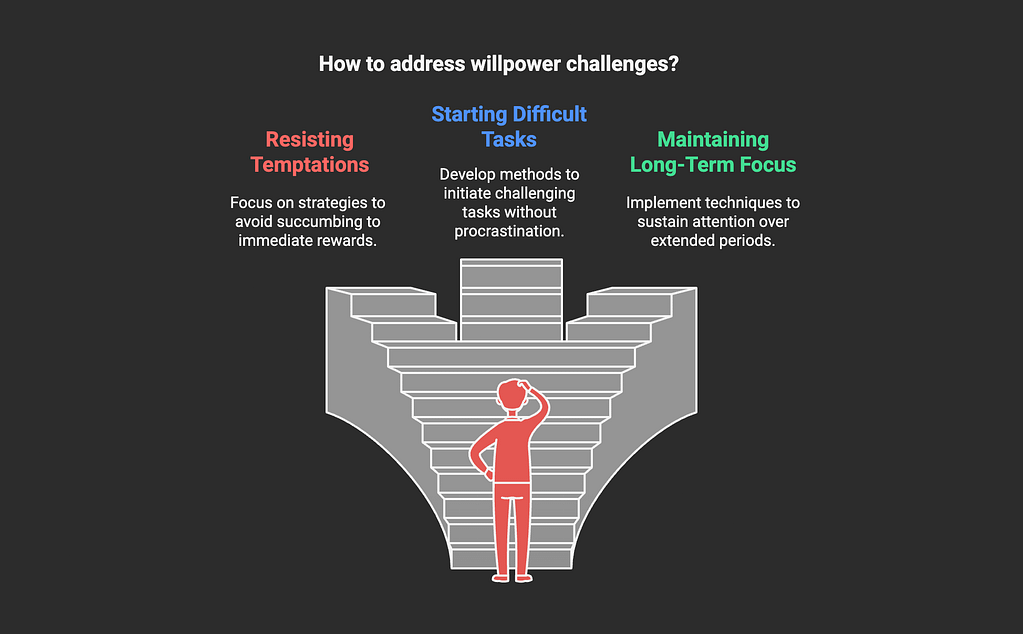
Resisting temptations
The fight against instant gratification is one of the toughest tests of willpower. Research shows that exposure to tempting stimuli can override our rational thinking and lead to impulse actions. Brain imaging studies found that people with lower self-control show more activity in their ventral striatum when they see tempting stimuli.
Our physical state plays a vital role in fighting temptations. Scientists found that blood glucose levels drop after we use willpower. This means keeping proper glucose levels is key to maintaining self-control. A study showed that sugar-sweetened lemonade helped restore depleted willpower, while sugar-free drinks did not work.
Starting difficult tasks
Starting challenging tasks is a unique willpower challenge that often shows up as procrastination. Studies show our inner drive affects how well we start difficult work. Research found that people who felt an internal push to finish tasks had better self-control than those driven by outside factors.
Research in psychology reveals:
- People who see tasks as meaningful stick with them longer
- Those with inner motivation have stronger willpower reserves
- People working toward personal goals feel less drained than those trying to please others
Maintaining long-term focus
The most complex willpower challenge lies in keeping focus on distant goals. Science shows that maintaining long-term concentration uses different mental resources than fighting short-term temptations. Many researchers chase goals for years with little immediate feedback, yet they keep going.
Our social interactions affect our focus. Studies show that dealing with tough interpersonal situations drains willpower. Research at the University of Minnesota found that people who had to make hostile audiences like them felt more drained than those who acted naturally.
Our environment affects our ability to stay focused. Research shows that removing distractions helps save willpower energy. Setting up spaces with clear success triggers helps keep long-term motivation strong.
Physical health and sustained focus go hand in hand. Studies show that lack of sleep hurts our ability to maintain focus. Getting enough rest is key to keeping willpower strong over time.
Our mindset shapes how well we maintain focus. Research shows that people who see willpower as unlimited show amazing resilience in chasing long-term goals. Students with this point of view showed better self-control under academic stress and were less likely to spend too much or eat unhealthily.
Understanding these three willpower challenges helps us develop better strategies for each type. We can pick the right techniques based on whether we’re fighting temptation, starting a hard task, or keeping long-term focus. This targeted approach works better than using the same willpower tricks for every situation.
Starting Your Willpower Training Plan
Science backs a systematic approach to build strong willpower. Research shows that training self-control boosts life quality and overall well-being.
Setting realistic willpower goals
Scientific studies prove that willpower development works best with SMART goals – Specific, Measurable, Achievable, Relevant, and Time-bound. Skip vague intentions. Focus on clear targets like “increase daily exercise from 15 minutes to 30 minutes within two months” or “meditate for 10 minutes daily for the next 30 days”.
A groundbreaking meta-analysis shows that self-control training makes regulatory abilities stronger. Success comes from picking goals that match the Goldilocks principle – not too easy, not too hard. This balanced approach keeps you motivated throughout your willpower development experience.
Employing various techniques on how to build willpower can lead to increased productivity.
Creating a progress tracking system
Progress tracking is a vital part of developing willpower. Virginia Tech research shows that seeing your progress visually makes you more motivated to reach goals. Here are some proven ways to track:
- Daily journaling to record wins and setbacks
- Habit-tracking apps to see progress
- Weekly self-reflection to check advancement
Of course, staying consistent with tracking matters. Research shows it takes about 66 days to form a new habit. Your tracking system should work with this timeline and stay flexible for long-term use.
Choosing your first willpower challenge
Science suggests starting small builds momentum. Studies show regular self-control practice makes willpower stronger, just like muscles grow with exercise.
The end goal is to create far-transfer effects, where your improved willpower helps in all areas of life. Start with smaller, doable tasks. Research proves that changing one habit at a time works better than trying many changes at once.
Physical exercise makes an excellent first willpower challenge. Yoga and intense training both build stress resilience and boost willpower. Research shows that morning willpower exercises work better because our self-control peaks early in the day.
Motivation techniques help you stay committed during training. The “10-minute rule” works well – just commit to 10 minutes when you feel resistance. This short pause lets your rational mind win over impulses and often leads to finished sessions.
Note that sleep quality shapes willpower development. Research shows that poor sleep affects how your body and brain use energy. This impacts your prefrontal cortex’s control over areas that handle cravings and stress responses. Good rest becomes key to successful willpower training.
Daily Exercises to Build Willpower
Small daily actions build lasting willpower strength. Your brain networks get stronger through consistent self-control practice, just like muscles grow with exercise.
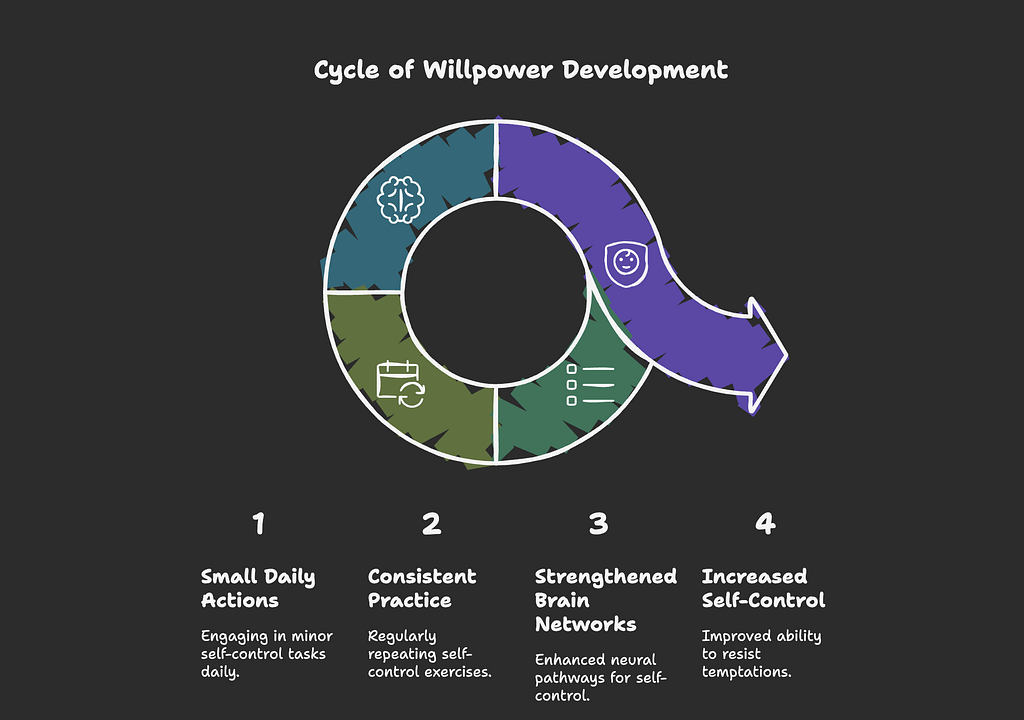
Morning willpower routines
A structured willpower workout first thing in the morning creates a strong foundation. Research shows that shocking your system with cold water triggers a quick fight-or-flight response. This releases adrenaline and endorphins that boost your self-control. You’ll build tolerance to uncomfortable situations and find it easier to resist urges all day.
Science backs this morning routine:
- Two-minute breathing exercises that activate your body’s relaxation response
- Write down one small win from yesterday to reinforce positive behavior
- Build delayed gratification through simple tasks like making your bed
- Picture yourself handling willpower challenges successfully
Quick 10-minute mindfulness sessions show real improvements in self-control after eight weeks. A well-laid-out morning routine helps save willpower by making certain decisions automatic.
Mini-challenges throughout the day
Your self-discipline grows naturally when you add strategic willpower exercises to your day. Several short daytime exercises work better than one long session. Here are some proven approaches:
Physical challenges make great willpower workouts. People who kept good posture for two weeks did much better on various willpower tests. Using your non-dominant hand for everyday tasks needs focus that builds self-control.
Changing how you speak builds willpower effectively. Studies show that switching casual greetings to formal ones or avoiding certain words strengthens self-regulation. People who kept detailed food or spending diaries saw their willpower improve.
Taking smart breaks is vital to keep willpower strong all day. A short walk without your phone can restore depleted willpower. Eating simple sugars from fruits during breaks gives you energy within minutes.
The “10-minute rule” helps build resistance to impulses. When you feel an urge to indulge in unwanted behavior, wait 10 minutes. This lets your rational mind catch up with your impulses. That brief pause often leads to smarter choices.
Paying attention to daily decisions naturally strengthens willpower. Studies show that understanding why we make specific choices helps us focus and resist temptations. This awareness stops automatic behaviors that might hurt our goals.
People who see willpower as unlimited show better self-control than those who think it can run out. Just changing this mindset often leads to substantial improvements in willpower performance.
Note that willpower exercises should progress gradually. You wouldn’t lift heavy weights without proper training. Start with manageable challenges and slowly increase difficulty. This approach helps you grow without overwhelming your current abilities.
Managing Your Willpower Energy
The science behind willpower depletion reveals powerful strategies to manage this vital resource. Research shows willpower works like a muscle – you can strengthen it through consistent exercise, but it needs proper care and recovery.
Physical factors affecting willpower
Sleep plays a vital role in willpower management. Studies show sleep deprivation hurts how the body and brain use energy, which affects the prefrontal cortex’s control abilities. The good news is that a good night’s rest helps most people recover their willpower completely.
Blood glucose levels directly affect your self-control strength. Scientists found that people whose glucose dropped after tough tasks did much worse on self-control tests later. Your brain needs high glucose levels to maintain willpower because it uses lots of energy.
Understanding physical aspects is also fundamental to how to build willpower.
Regular physical exercise builds both mental and physical stamina. Working out improves heart rate variability and blood glucose control, which helps you regulate yourself better. Both intense cardio and mindful exercises like yoga help you handle stress better.
Mental strategies for conservation
Smart planning helps preserve willpower throughout the day. Research shows that organizing your routines cuts down on unnecessary decisions and saves mental energy. To cite an instance, planning meals and workouts ahead means you won’t drain willpower making constant choices.
Research highlights how changing your environment helps conserve willpower. Getting rid of temptations around you saves self-control energy. Yes, it is true – office workers who kept candy in their desk drawers ate less than those who left it in plain sight.
Your mindset shapes how willpower gets depleted. The sort of thing I love is that people who see willpower as unlimited show more resilience when things get tough. These people stay focused even after difficult tasks, unlike those who think willpower runs out easily.
Recovery techniques
Incorporating healthy habits is a vital part of learning how to build willpower.
Smart recovery strategies help rebuild depleted willpower. Taking short breaks throughout the day can restore your self-control. Stress-reduction methods like meditation, self-hypnosis, and tai chi work exceptionally well to rebuild willpower.
Good nutrition helps restore willpower. Studies indicate that low glycemic index foods keep your energy steady and help you avoid willpower-draining blood sugar crashes. Staying hydrated is key too, since mental fatigue often shows up first when you’re dehydrated.
A better mood works wonders to recover willpower. Research proves that positive emotions help restore depleted willpower. Simple things like watching funny videos or getting unexpected gifts help overcome willpower depletion.
Research shows the value of using willpower strategically. Successful people don’t try to control everything – they choose their battles and focus on what matters most. This approach leads to lasting success in reaching personal goals.
Ultimately, managing your environment plays a critical role in how to build willpower effectively.
Creating a Willpower-Friendly Environment
Your surroundings shape your self-control capabilities. Research shows that design elements directly affect your habits, productivity, and mental well-being. You can create spaces that naturally support your willpower goals by making smart changes to your environment.
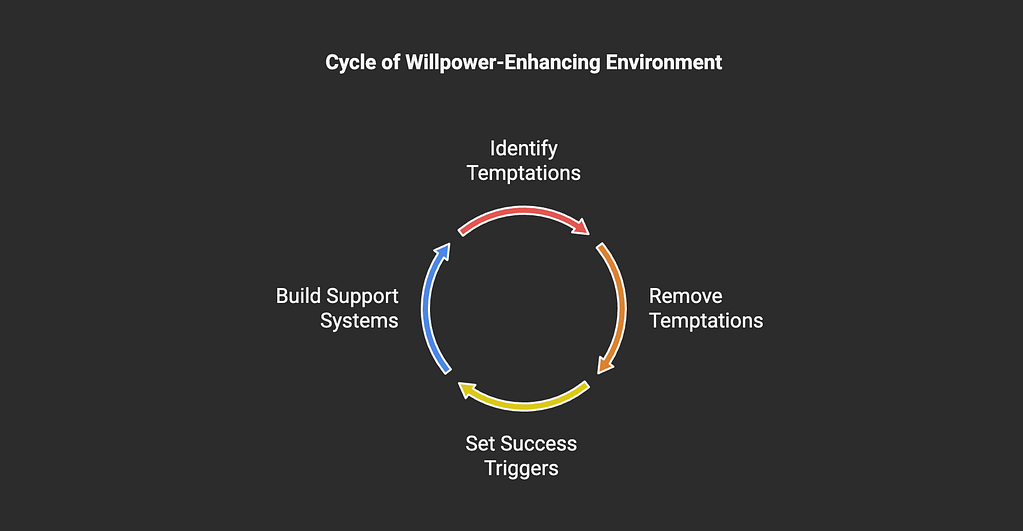
Removing unnecessary temptations
Space design shapes which behaviors stick. Research shows office workers eat less candy when they keep it in desk drawers instead of visible spots. This simple change shows how smart environmental tweaks reduce willpower drain.
Brain-architecture research reveals our surroundings affect emotions, thoughts, and stress. You can build spaces that boost mental toughness by using these proven changes:
- Smart furniture placement reduces distractions
- Good lighting keeps energy levels up
- Ergonomic workstations cut physical strain
- Right colors promote focus and calm
Setting up success triggers
Smart design helps build good habits through environmental cues. Spaces built with specific goals boost productivity. Colors show clear effects on behavior and focus. The right color choices create an atmosphere that helps maintain willpower.
Physical spaces affect how our brains handle emotions and behavior. Calm sensory spaces provide breaks that help cut overstimulation and restore depleted willpower. People use these areas to:
- Practice self-control methods
- Handle tough emotions
- Recover from mental tiredness
- Rebuild focus and drive
Modern people have more control over their environment than ancient farmers who couldn’t remove obstacles. Smart environmental design lets you create what experts call “distributed willpower” – multiple points of self-control support throughout your space.
Building support systems
Strong support networks are vital to develop lasting willpower. Social relationships heavily influence our ability to stick to long-term goals. Good support systems offer:
- Emotional backup during challenges
- Help with obstacles
- Shared wisdom and experiences
- Regular check-ins
People who share their goals with others succeed more often. Being around others with similar goals naturally strengthens commitment to personal targets.
Environment affects both physical spaces and social dynamics. Smart design choices aid team collaboration and create spaces that encourage talking and mutual support. This shared environment spreads the willpower load across many people, making it easier to focus on group goals.
Research shows people who believe willpower isn’t limited handle tough tasks better, especially under pressure. Creating an environment that supports this positive mindset builds a foundation for continued willpower growth.
Environmental changes work best when they match your current habits. Design new habits that fit naturally into your daily routine. This approach cuts resistance and helps build lasting success.
Smart environmental design, regular social support, and well-planned success triggers create spaces that boost your willpower instead of draining it. These environmental supports spread out the self-control load and help you stay focused on goals even in tough times.
Advancing to Harder Willpower Challenges
Your willpower grows stronger just like muscles do when you challenge them systematically. Studies show that you can build up your self-control through regular training.
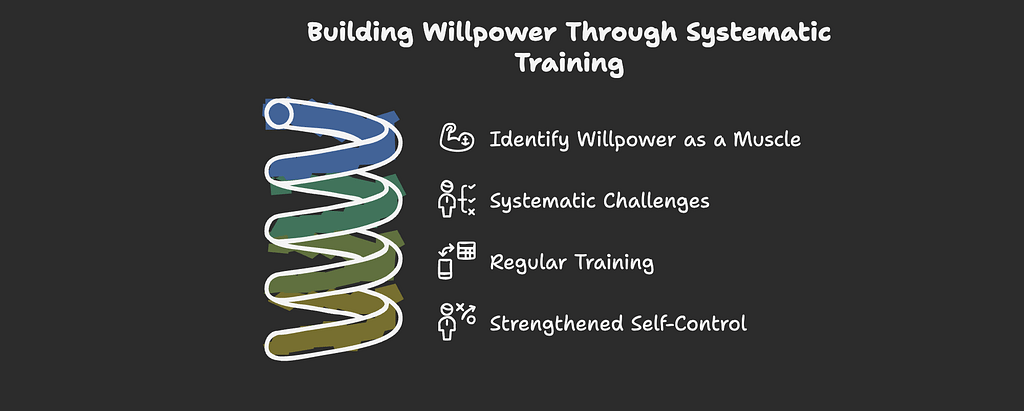
When to increase difficulty
Your body and mind tell you when you’re ready for bigger challenges. People who stick to their habits for at least 66 days can handle more willpower challenges. Those who see willpower as unlimited show amazing resilience when taking on tougher tasks.
You know you’re ready to level up when:
- You consistently nail your current challenges
- Your energy stays steady all day
- You bounce back quickly from setbacks
- Your existing habits feel natural
Handling setbacks
Think of setbacks as chances to learn rather than failures. People who learn from their setbacks tend to succeed more in the long run. Small setbacks can actually boost your drive toward big achievements.
The strength model shows that willpower works like a muscle – it gets stronger with training. Your self-control might dip sometimes because adenosine builds up in your brain’s prefrontal regions.
Here’s how to bounce back from setbacks:
Creating supportive networks enhances efforts on how to build willpower in everyday life.
- Look at triggers without emotion
- Update your game plan based on what you learn
- Get back to your routine quickly
- Write down the lessons
Maintaining momentum
You need the right mix of challenge and rest to keep moving forward. Taking planned breaks helps you stay sharp without burning out. Smart break timing lets you maintain focus while keeping your mental energy high.
Science backs up interval-based willpower training. This method switches between intense focus and recovery periods. Small wins deserve celebration because they reinforce good habits and create an upward spiral of improvement.
Progress tracking makes a huge difference in keeping you going. Visual progress maps light up your motivation. Regular tracking helps you spot patterns and adjust your approach as you tackle bigger goals.
Exercise packs a punch in keeping your momentum strong. Regular workouts boost both your mental and physical stamina. Morning workouts seem to work best since your willpower tank tends to be fullest early in the day.
Your blood sugar levels play a vital role in your willpower game. Research links blood sugar ups and downs directly to self-control. Smart eating habits become your secret weapon as you take on tougher challenges.
Conclusion

Research shows that willpower works like a muscle you can train. You can build your self-control abilities and create better life outcomes through consistent practice and proper management.
Your success in developing willpower depends on three elements. You need to understand your current capabilities and follow a well-laid-out training approach. Creating supportive environments matters too. These evidence-based strategies work better than motivation alone to improve your self-control.
Physical factors substantially affect your willpower strength. A foundation of good sleep, proper nutrition, and regular exercise helps improve self-control. You can maintain steady progress toward tougher goals by designing your environment strategically and building strong support systems.
Setbacks are normal when you work to strengthen your willpower. Every challenge teaches you something valuable about refining your approach. You can build lasting improvements in self-control by starting small and tracking your progress. Gradually increase the difficulty levels as you improve.
Building stronger willpower guides you toward better physical health and improved mental well-being. These research-backed strategies give you the tools you need to build lasting self-control and accomplish your most important goals.
FAQs
Q1. How can I effectively build my willpower? Start with small, consistent challenges rather than extreme ones. Set up daily routines, remove unnecessary temptations from your environment, and gradually increase the difficulty of your willpower exercises over time.
Q2. Is willpower a limited resource? While willpower was once thought to be finite, recent research suggests our beliefs about willpower influence its limits. Those who view it as unlimited tend to demonstrate greater resilience. However, it’s still important to manage your mental energy strategically throughout the day.
Q3. What role does sleep play in strengthening willpower? Adequate sleep is crucial for maintaining strong willpower. It helps replenish your mental energy, improves decision-making abilities, and enhances your prefrontal cortex’s control capabilities. Aim for 7-9 hours of quality sleep each night.
Q4. How can I create a willpower-friendly environment? Design your surroundings to support your goals. Remove visible temptations, use visual cues to reinforce positive habits, and set up “success triggers” that make it easier to make good choices. Also, build a support network of like-minded individuals.
Q5. What should I do when I experience a willpower setback? View setbacks as learning opportunities rather than failures. Analyze what triggered the lapse, adjust your strategies accordingly, and promptly resume your normal routine. Remember that occasional setbacks are a normal part of building stronger willpower over time.
Overall, understanding how to build willpower can lead to considerable life improvements.
Each answer contributes to the broader understanding of how to build willpower.








